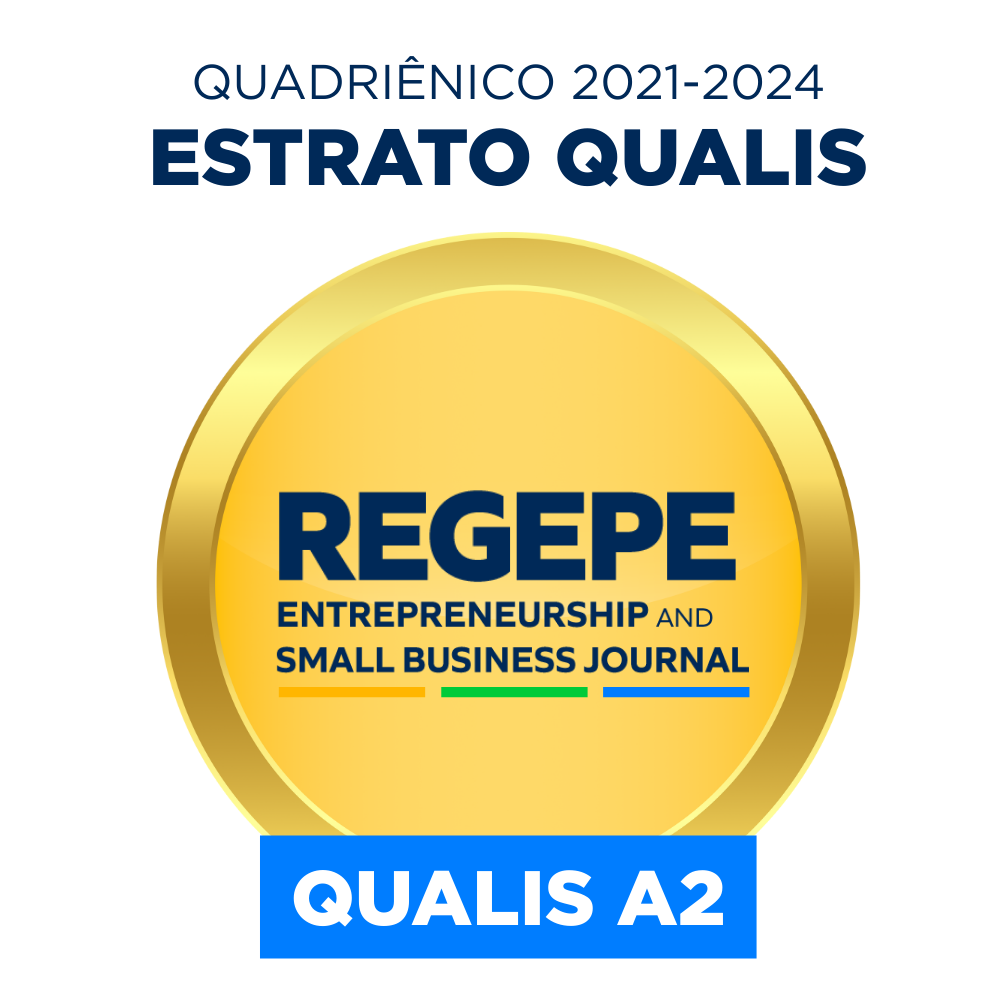A Internacionalização no Processo de Inovação das Startups Brasileiras de Tecnologia da Informação e Comunicação (TIC)
DOI:
10.14211/regepe.v9i2.1577Palavras-chave:
Estratégia de Internacionalização, Processo de Inovação, Startups, Tecnologia da Informação e Comunicação (TIC).Resumo
Objetivo: Compreender como o processo de inovação é impactado pela estratégia de internacionalização das startups brasileiras de TIC.
Método: Adotou-se como estratégia, o estudo de casos múltiplos em sete startups de internacionalizadas. A análise foi pautada pelos conceitos de estratégia de internacionalização definidos por Carneiro e Dib (2007) e o processo de inovação de Tidd e Bessant (2009). Os dados foram coletados por meio de entrevistas com os fundadores das startups, análise documental e observação.
Originalidade/Relevância: Os temas de internacionalização e inovação são geralmente abordados separadamente e têm o foco, principalmente, em grandes empresas. Estudos sobre a relação da estratégia de internacionalização e inovação de startups são escassos na literatura acadêmica, principalmente em países emergentes.
Resultados: A motivação, a escolha do país, o tempo, o que internacionalizaram e a forma como as startups chegaram a países do exterior impactaram o processo de inovação das startups. Contudo, observou-se que a motivação, a escolha do país e a forma de entrada contribuíram mais para o processo de inovação dessas empresas nascentes.
Contribuições teóricas/metodológicas: A contribuição acadêmica trazida por este trabalho é a observação empírica do processo de inovação, considerando a internacionalização em startups em um país em desenvolvimento. Através dos resultados, oito proposições foram levantadas sinalizando um caminho futuro para a abordagem dos temas de estudo.
Contribuições sociais / para a gestão: A relevância gerencial deste trabalho é fundamentada no estudo do processo de inovação como uma forma de as startups manterem-se competitivas. Ao identificarem estratégias de internacionalização que levam as startups ao avanço no processo de inovação, as startups de TIC brasileiras e as políticas públicas podem se posicionar no sentido de incentivarem o desenvolvimento dessas estratégias.
Downloads
Referências
Abreu, P., & Campos, N. (2016). O Panorama das Aceleradoras de Startups no Brasil. CreateSpace Independent Publishing Platform. USA, FGV-EAESP.
Abstartup. (2019). Associação Brasileira de Startups. Disponível em: <https://abstartups.com.br/>. Acesso em: 28 fev. 2019.
Ansoff, H. I. (1993). Implantando a Administração Estratégica. 2. ed., São Paulo: Atlas.
Alcácer, J., Cantwell, J., & Piscitello, L. (2016). Internationalization in the information age: A new era for places, firms, and international business networks? Journal of International Business Studies, v. 47, pp. 499-512, DOI: 10.1057/jibs.2016.22. DOI: https://doi.org/10.1057/jibs.2016.22
Autio, E., Sapienza, H, & Almeida, J. (2000) Effects of Age at Entry, Knowledge Intensity, and Imitability on International Growth. Academy of Management Journal, v. 43, n. 5, pp. 909-924. DOI: https://doi.org/10.5465/1556419
Barakat, L. L., Cretoiu, S. L., Simões, L. G., Resende, L. V., & Alvim, F. M. (2017). Ranking FDC das Multinacionais Brasileiras. 12. ed. Fundação Dom Cabral.
Baregheh, A., Rowley, J., & Sambrook, S. (2009). Towards a Multidisciplinary Definition of Innovation. Management Decision, v. 47, n. 8, pp.1323-1339. DOI: https://doi.org/10.1108/00251740910984578
Blank, S., & Dorf, B. (2012). The Startup Owner’s Manual. Alta Books.
Bicudo, L. (2016) Afinal, O que é uma Startup? Startse Infomoney. São Paulo. Disponível em: < https://www.startse.com/noticia/startups/18963/afinal-o-que-e-uma-startup>. Acesso em: 28 abr. 2019.
Boermans, M. A., & Roelfsema, H. (2016). Small Firm Internationalization, Innovation, and Growth. International Economics and Economic Policy, v. 13, n. 2, pp. 283-296. DOI: https://doi.org/10.1007/s10368-014-0310-y
Cannone, G., & Ughetto, E. (2015). Internationalization Flows of High-Tech Start-Ups: A gravity model. European Business Review, v. 27, n. 1, pp. 60-79. DOI: https://doi.org/10.1108/EBR-03-2014-0020
Carneiro, J., & Dib, L. A. (2007). Avaliação Comparativa do Escopo Descritivo e Explanatório dos Principais Modelos de Internacionalização de Empresas. INTERNEXT – Revista Eletrônica de Negócios Internacionais Da ESPM, v. 2, n. 1, pp. 1-25. DOI: https://doi.org/10.18568/1980-4865.211-25
Coviello, N. (2016). The Network Dynamics of International New Ventures. Journal of International Business Studies, v. 37, pp. 713-731. DOI: https://doi.org/10.1057/palgrave.jibs.8400219
Da Rocha, A., Simões, V. C., Mello, R. C., & Carneiro, J. (2017) From Global Start-Ups to the Borderless Firm: Why and how to build a worldwide value system. Journal of International Entrepreneurship, v.15, n.2, p.121-144. DOI: https://doi.org/10.1007/s10843-017-0200-9
Galina, S. R. V. (2018) Internacionalização para Inovação: Um estudo com empresas brasileiras de TIC. Tese (Livre Docência), Universidade de São Paulo, Faculdade de Economia, Administração e Contábeis de Ribeirão Preto.
Goodman, L. A. (1961). Snowball Sampling. Annals of Mathematical Statistics. 32:148-70. DOI: https://doi.org/10.1214/aoms/1177705148
Gopalakrishnan, S. (2000). Unravelling the Links Between Dimensions of Innovation and Organizational Performance. The Journal of High Technology Management Research, v. 28, n. 1, pp. 109-119. DOI: https://doi.org/10.1016/S1047-8310(00)00024-9
Handcock, M. S., & Gile, K. J. (2011). Comment: On the Concept of Snowball Sampling. Sociological Methodology, v. 41, n. 1, pp. 367-371. Disponível em: <https://doi.org/10.1111/j.1467-9531.2011.01243.x>. Acesso em: 21 jul. 2019. DOI: https://doi.org/10.1111/j.1467-9531.2011.01243.x
Hippel, E. (2005). Democratizing innovation. 6. ed. Cambridge, Mass: MIT Press. DOI: https://doi.org/10.7551/mitpress/2333.001.0001
Hsu, C. W., Lien, Y. C., Chen, H. (2015). R&D Internationalization and Innovation Performance. International Business Review, v. 24, n. 2, pp.187-195. DOI: https://doi.org/10.1016/j.ibusrev.2014.07.007
Jenner, B. M., & Myers, C. K. (2019). Intimacy, rapport, and exceptional disclosure: a comparison of in-person and mediated interview contexts. International Journal of Social Research Methodology, v. 22, n. 2, pp. 165-177.
DOI: 10.1080/13645579.2018.1512694 DOI: https://doi.org/10.1080/13645579.2018.1512694
Jones, M. V., Coviello, N. E. (2015) Internationalisation: Conceptualising an entrepreneurial process of behaviour in time. Journal of International Business Studies, v. 36, pp. 284-303. DOI: https://doi.org/10.1057/palgrave.jibs.8400138
Kafouros M. I, Buckleya, P. J., Sharp, J. A., & Wang, C. (2018). The Role Of Internationalization in Explaining Innovation Performance. Technovation, v. 28, n. 1-2, pp. 63-74. Disponível em: <https://doi.org/10.1016/j.technovation.2007.07.009>. Acesso em: 3 mai. 2019. DOI: https://doi.org/10.1016/j.technovation.2007.07.009
Knight, G. A., Cavusgil, S. T. (1996). The Born Global Firm: A challenge to traditional internationalization theory. Advances in International Marketing, v. 8, pp.11-26.
Kuivalainen, O., Sundqvist, S., & Servais, P. (2007). Firms’ Degree of Born-Globalness, International Entrepreneurial Orientation and Export Performance. Journal of World Business, v. 42, n. 3, pp. 253-267. DOI: https://doi.org/10.1016/j.jwb.2007.04.010
Laurell, H., Achtenhagen, L., & Andersson, S. (2017). The Changing Role of Network Ties and Critical Capabilities in an International New Venture’s Early Development. International Entrepreneurship and Management Journal, v. 13, n. 1, pp. 113-140. DOI: https://doi.org/10.1007/s11365-016-0398-3
Madsen, T. K., & Servais, P. (1997) The Internationalization of Born Globals: An evolutionary process? International Business Review, v. 6, n. 6, pp. 561-583. DOI: https://doi.org/10.1016/S0969-5931(97)00032-2
Magnani, G., & Zucchella, A. (2019). Coping with uncertainty in the internationalisation strategy: An exploratory study on entrepreneurial firms. International Marketing Review, v. 36, n. 1, pp.131-163. Disponível em: <https://doi.org/10.1108/IMR-02-2017-0042>. Acesso em: 13 mai. 2019. DOI: https://doi.org/10.1108/IMR-02-2017-0042
Neubert, M. (2018). The Impact of Digitalization on the Speed of Internationalization of Lean Global Startups. Technology Innovation Management Review. v. 8, n. 5. DOI: https://doi.org/10.22215/timreview/1158
OCDE. (2018). Oslo Manual 2018: Guidelines for Collecting, Reporting and Using Data on Innovation, 4. ed. The Measurement of Scientific, Technological and Innovation Activities, OECD Publishing, Paris/Eurostat, Luxembourg. DOI: https://doi.org/10.1787/9789264304604-en
OCDE. (2017). ICT and innovation, in OECD Science, Technology and Industry Scoreboard: The digital transformation, OECD Publishing, Paris. Disponível em: <http://dx.doi.org/10.1787/sti_scoreboard-2017-24-en>. Acesso em: 24 ago. 2019.
Oviatt, B. M., & Mcdougall, P. P. (1994) Toward a Theory of International New Ventures. Journal of International Business Studies, v. 25, n. 1, pp. 45-64. DOI: https://doi.org/10.1057/palgrave.jibs.8490193
Pilwarsch, P. (2017). Early Internationalizing Firms in the Brazilian Software Industry. 2017. Dissertação (Mestrado) - Escola Brasileira de Administração Pública e de Empresas, Centro de Formação Acadêmica e Pesquisa, 51p.
Rasmussen, E. S., & Tanev, S. (2015) The Emergence of the Lean Global Start-Up as a New Type of Firm. Technology Innovation Management Review, v. 5, n. 11, pp.12-19. DOI: https://doi.org/10.22215/timreview941
Rhyne, L. C., Teagarden, M. B., & Panhuyzen, W. (2002). Technology-Based Competitive Strategies: The relationship of cultural Dimensions to new product innovation. Journal of High Technology Management Research, v. 13, n. 2, pp. 249-277. DOI: https://doi.org/10.1016/S1047-8310(02)00047-0
Ries, E. (2012). A Startup Enxuta: Como os Empreendedores Atuais Utilizam a Inovação Contínua para Criar Empresas Extremamente Bem-Sucedidas. Brasil: Leya.
Rujirawanich, P., Addison R., & Smallman, C. (2011). The Effects of Cultural Factors on Innovation in a Thai SME. Management Research Review, v. 34, n. 12, pp. 1264-1279. DOI: https://doi.org/10.1108/01409171111186397
Sampson, R. C. (2007). R&D Alliances and Firm Performance: The impact of technological diversity and alliance organization on innovation. Academy of Management Journal, v. 50, n. 2, pp. 364-386. DOI: https://doi.org/10.5465/amj.2007.24634443
Stayton, J., & Mangematin, V. (2016). Startup Time, Innovation and Organizational Emergence: A study of USA-based international technology ventures. Journal of International Entrepreneurship, v. 14, n. 3, pp. 373-409. DOI: https://doi.org/10.1007/s10843-016-0183-y
Tanev, S. (2017). Is There a Lean Future for Global Startups? Technology Innovation Management Review, v. 7, n. 5, pp. 6-15. Disponível em: DOI: https://doi.org/10.22215/timreview1072
<http://timreview.ca/article/1072>. Acesso em: 12 ago. 2019. DOI: https://doi.org/10.5771/9783845279893-1072
Tidd, J., & Bessant, J. (2009). Managing Innovation Integrating Technological, Market and organizational Change. 4. ed. Whiley and Sons Ltd., 600p.
Weerawardena, J., Gillian, S. M., Salunke, S., Knight, G., & Liesch, P. (2015) The Role of the Market Sub-System and the Socio-Technical Sub-System in Innovation and Firm Performance: A dynamic capabilities approach. Journal of the Academy of Marketing, v. 43, pp. 221-239. DOI: https://doi.org/10.1007/s11747-014-0382-9
Yang, T. T., & Li, C. R. (2011). Competence Exploration and Exploitation in New Product Development: The moderating effects of environmental dynamism and competitiveness, Management Decision, v. 49, n. 9, pp. 1444-1470. DOI: https://doi.org/10.1108/00251741111173934
Yin, R. K. (2015) Estudo de Caso: Planejamento e métodos. 5. ed. Porto Alegre: Bookman, 320p.
Zahra, S. A., Ireland, R. D., & Hitt, M. A. (2000). International Expansion by New Venture Firms: International diversity, mode of market entry, technological learning, and performance. Academy of Management Journal, v. 43, n. 5, pp. 925-950. DOI: https://doi.org/10.2307/1556420
Zijdemans, E., & Tanev, S. (2014). Conceptualizing Innovation in Born- Global Firms. Technology Innovation Management Review, v. 4, n. 9, pp. 5-10. DOI: https://doi.org/10.22215/timreview/826
Downloads
Publicado
Métricas
Visualizações do artigo: 2160 PDF downloads: 476 PDF (English) downloads: 582
Como Citar
Edição
Seção
Licença
Autores que publicam nesta revista concordam com os seguintes termos:
- O(s)/A(s) autor(es)/autora(s) autorizam a publicação do texto na revista;
- A revista não se responsabiliza pelas opiniões, ideias e conceitos emitidos nos textos, por serem de inteira responsabilidade de seus autores/autoras;
- Autores/autoras mantêm os direitos autorais e concedem à revista o direito de primeira publicação, com o trabalho publicado sob a Licença CC BY 4.0
, que permite o compartilhamento do trabalho com reconhecimento da autoria e publicação inicial nesta revista;
- Autores/autoras são permitidos e encorajados a postar seu trabalho (Versão submetida, Versão aceita [Manuscrito aceito pelo autor/autora] ou Versão publicada [Versão do registro]) online, por exemplo, em repositórios institucionais ou preprints, pois isso pode levar a trocas produtivas, bem como a citações anteriores e maiores de trabalhos publicados. A REGEPE pede como condição política para os autores/autoras que indiquem/vinculem o artigo publicado com DOI. Veja o Efeito do Acesso Livre.
















